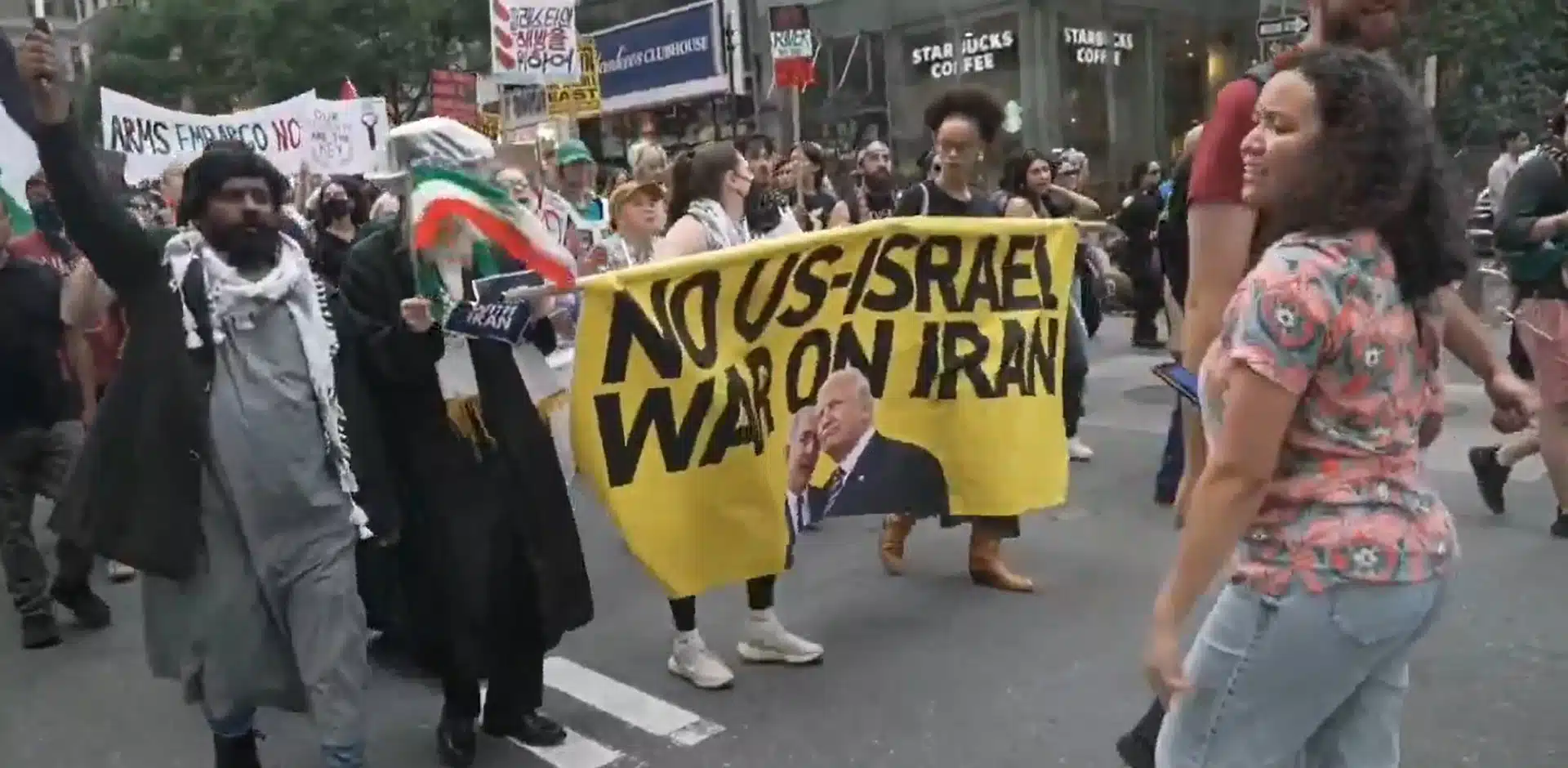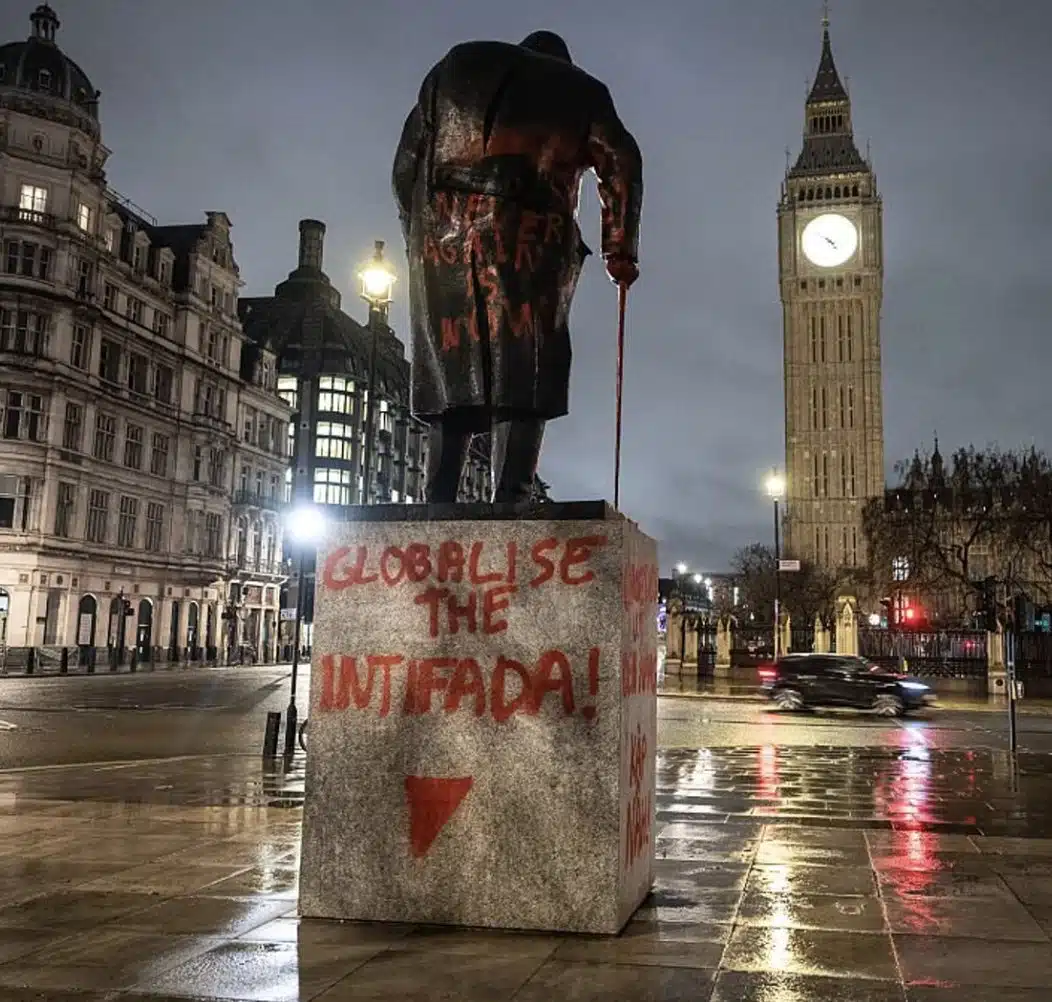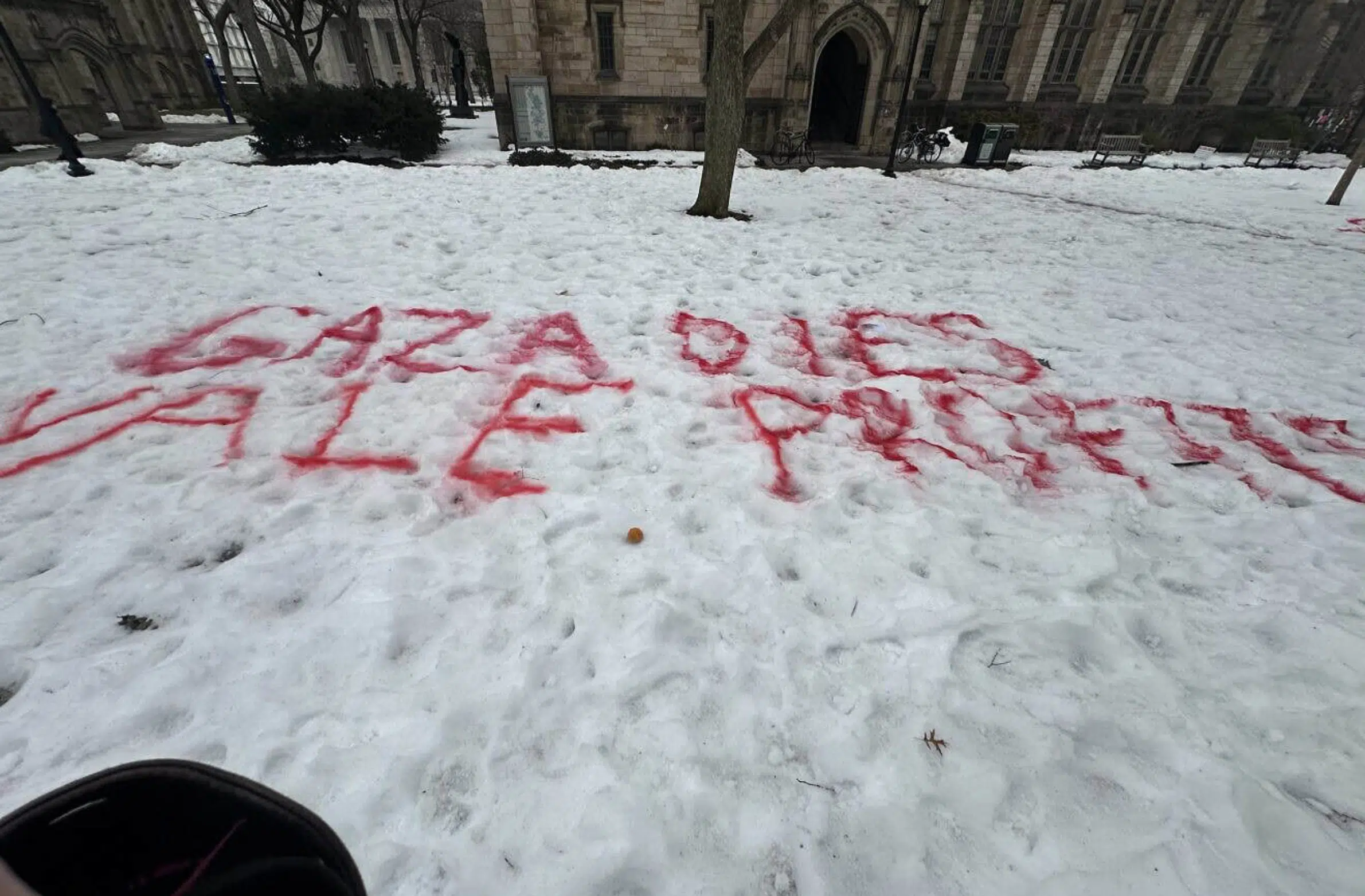|
Getting your Trinity Audio player ready...
|
In the aftermath of Israel’s launch of pre-emptive strikes against Iranian nuclear facilities last week, Islamist and far-left demonstrators across the globe have exploited the intensifying conflict in the Middle East to propagate longstanding antisemitic tropes, incite violence against Jews, and spread disinformation vilifying and delegitimizing the Jewish state.
The Antisemitism Research Center (ARC) by CAM is closely monitoring this dangerous phenomenon, which is exacerbating the already-elevated threat levels Jewish communities worldwide have faced since the October 7th massacre in Israel more than a year and a half ago.
Washington, D.C.: Anti-War Protest or Antisemitic Platform?
On June 13, CodePink organized a protest outside the Israeli Embassy in Washington, D.C. While framed as an anti-war demonstration, the rally featured inflammatory antisemitic rhetoric, accusing Israel — a nation under sustained missile attack — of committing genocide and calling for an arms embargo against it. Protesters also chanted “Hands off Iran,” aligning themselves explicitly with the Tehran regime.
The protest did not call out the Iranian regime’s long history of support terrorism, nor did it mention the Israeli civilians killed by Iran’s recent missile strikes. This selective outrage reveals how anti-war messaging can be co-opted to excuse antisemitism and justify violence.
In front of the Israeli Embassy, we say: NO MORE WAR WITH IRAN.
Israel, a nuclear-armed state committing genocide in Gaza, just launched a reckless attack on Iran, risking a catastrophic regional war.
The U.S. government stays silent on Israel’s nukes and war crimes, but we… pic.twitter.com/8JdpNwkGY3— CODEPINK (@codepink) June 13, 2025
Times Square: A Rally for Iran Becomes a Rally for Hate
The most disturbing display came on June 17 in New York City’s Times Square, where a crowd gathered at a rally backing the Islamic Republic. Protesters chanted: “Iran, Iran makes us proud! Burn Tel Aviv to the ground!”; “US drones in the sky, Iran’s missiles will reply!”; and “Courts and talks won’t set us free, resistance brings victory!”
By glorifying Iran’s attacks on Israel as “resistance,” the rally crossed the line from legitimate political expression to open antisemitic genocidal incitement.
🇮🇷Scenes from today’s Solidarity with Iran rally in NYC.
Chants heard at the rally:
“Iran, Iran makes us proud! Burn Tel Aviv to the ground!”
“US drones in the sky, Iran’s missiles will reply!”
“Courts and talks won’t set us free, resistance brings victory!” pic.twitter.com/rQDyGn5BD7
— 🇲🇽🇵🇸Bronx Anti-War 🇾🇪🇮🇷🇱🇧🇮🇶 (@BXAntiWar) June 17, 2025
Montreal: “Hit Tel Aviv” and the Rise of Violent Chants
On June 16, during a pro-Iran demonstration in Montreal, Quebec, protesters chanted: “Hit, hit Tel Aviv!” — a direct call for the murder of Israeli civilians.
The Centre for Israel and Jewish Affairs (CIJA) condemned the incitement, stating, “This Iranian regime rhetoric is not only dangerous to our community but to Canadian values.” The incident highlighted the disturbing ease with which genocidal slogans are now chanted openly on Western streets under the guise of “resistance.”
Calls for the murder of Israeli civilians — like “Hit, hit Tel Aviv,” chanted yesterday in Montreal — are vile and disturbing. We cannot allow incitement to violence on Canadian streets. This Iranian regime rhetoric is not only dangerous to our community but to Canadian values. pic.twitter.com/5ltlqVftTE
— CIJA (@CIJAinfo) June 16, 2025
European Capitals: Demonization on Display
Across Europe, the message was disturbingly similar. In London, England, demonstrators at Parliament Square — led by the Palestine Solidarity Campaign — carried Iranian flags and demanded a UK arms embargo on Israel.
In Paris, France, demonstrations saw thousands of protesters reciting slogans such as “Military embargo!” and “Free Palestine!” Banners read “Netanyahu guilty of genocide” and “Free Georges Abdallah” — referencing the Marxist terrorist imprisoned for murdering American and Israeli diplomats in 1982. Protesters praised Iran’s attacks on Israel, blamed France for inaction, and invoked fears of global war.
In Berlin, Germany, a rally organized by pro-Palestinian groups drew hundreds of demonstrators who voiced support for Iran and condemnation of Israel. Protesters shouted slogans such as “Boycott Israel,” “From the river to the sea, Palestine will be free.” These chants are not calls for peace — they are demands for the destruction of the State of Israel. “From the river to the sea” explicitly calls for the elimination of Israel, while “Free Palestine” has increasingly been used to justify violence against Jews — including in recent attacks in Washington, D.C. and Boulder, Colorado. The call to “Boycott Israel” aims to isolate, delegitimize, and ostracize the Jewish state from the international community.
Turkish Parliament: Institutionalizing Antisemitic Narratives
On June 18, the Turkish Grand National Assembly unanimously passed a motion accusing Israel of “systematic genocide” in Gaza and “pursuing a regional conflict strategy aimed at destabilizing peace in the region.”
The resolution’s language mirrored antisemitic tropes long embedded in Islamist and authoritarian discourse. It demonized the Israeli government, denied the legitimacy of Israeli self-defense, and gave political legitimacy to Iranian attacks.
Palestinian Authority Media: Tragedy Twisted into Libel
Following the deaths of four Israeli Arab women during an Iranian missile strike in Tamra, Palestinian Authority (PA) leaders and media outlets seized the moment to propagate a modern blood libel: that Israel refuses to build bomb shelters for its Arab citizens as a matter of racist policy.
Despite clear evidence that the women did have access to a shelter, the PA’s official TV station, as well as its daily newspaper Al-Hayat al-Jadida, perpetuated the false narrative for days, aiming to vilify Israel and cast it as deliberately endangering Arab citizens.
Yemen: State-Sanctioned Antisemitism From the Houthis
In Houthi-controlled Yemen, tens of thousands participated in mass rallies on June 13 — organized by the Iran-backed Houthis — across Sanaa, Saada, Dhamar, Hodeida, and Amran. Demonstrators wielded rifles, daggers, and Qur’ans, chanting slogans such as “Death to America! Death to Israel!”
In Yemen, such chants are not isolated incidents, but rather an official part of Houthi propaganda, demonstrating that antisemitism is embedded at the highest levels of state-affiliated messaging and protest.
Iraq: Militia-Led Marches Promote Genocidal Ideology
In Iraq, the Iran-aligned Coordination Framework — an umbrella organization comprising the country’s leading Shi’a parties and militias — is actively mobilizing mass demonstrations in support of the Islamic Republic. On June 13 and 16, rallies in Baghdad and southern provinces featured pro-Iran banners, portraits of Ayatollah Khamenei, Kata’ib Hezbollah flags, and chants vilifying both Israel and the United States.
Ali al-Daffayi, spokesperson for the Islamic Supreme Council of Iraq (ISCI) — a prominent member of the Coordination Framework — announced that additional mass protests were being prepared “so that the Iraqi people’s voice echoes in solidarity with the Islamic Republic of [Iran].” He further called on Baghdad to acquire advanced air defense systems to prevent Israeli strikes from traversing Iraqi airspace, and warned that “we must seek [defenses] from other countries” if the U.S. refused to provide them.
Daffayi claimed Israel was attempting to “drag the entire region into total mayhem,” adding “we are united in condemning the [Israeli] aggression, in backing the Islamic Republic and its right to defend itself.”
On June 14, the Iraqi government submitted a formal complaint to the United Nations Security Council, accusing Israel of violating Iraqi sovereignty by using its airspace to carry out strikes on Iran. The Iraqi News Agency described the strikes as a “flagrant violation” of international law, and demanded that the UNSC “deter the Zionist entity.”
These political and militia-backed demonstrations in Iraq underscore the Iranian regime’s ideological influence in the region — and the extent to which antisemitism and anti-Israel incitement serve as vehicles for sectarian solidarity.
Latin America Joins the Chorus of Hate
In Brazil, mass protests targeted Israel with militant rhetoric. In São Paulo, a rally of approximately 30,000 participants, organized by Brazil’s largest pro-Palestine social movements and unions, accused Israel of “genocide” and “apartheid,” and demanded that the Brazilian government sever diplomatic and trade relations with Israel in direct response to its strikes on Gaza and Iran. Protest leader Soraya Misleh proclaimed that calling for isolation of Israel mirrored historical actions against South African apartheid.
TikTok’s “Just Do It” Meme: Online Incitement in the Age of Geopolitical War
This hatred further metastasizes online — reaching millions with just a swipe.
In the wake of Israel’s strikes on Iranian nuclear sites, a chilling meme spread rapidly across TikTok: “Iran, if you’re listening, just do it.”
What began as a slogan quickly evolved into a viral trend — with videos explicitly or implicitly calling for the destruction of Israel, praising Iranian missile attacks, and featuring disturbing references to Hitler and Nazi ideology. One post alone garnered over 1.4 million views before being removed.
TikTok reportedly took action only after media inquiries, underscoring the platform’s slow and inconsistent enforcement of its own hate speech policies.
“This is not just offensive — it’s dangerous,” said Alex Ryvchin, Co-CEO of the Executive Council of Australian Jewry. “These posts openly call for the destruction of a country and the deaths of millions of people — Jews, Arabs, and Christians alike.”
The trend is part of a broader surge in online antisemitism, which has skyrocketed since October 7, 2023. According to recent data, global antisemitic incidents rose by approximately 340% in 2024, with online antisemitic content up more than 300%. Holocaust denial, incitement, and glorification of violence have become increasingly normalized on platforms like TikTok and X (formerly Twitter), particularly among younger users.
When Rallies for Iran Become Antisemitic Campaigns
The past week has made one thing unmistakably clear: support for a genocidal regime often goes hand in hand with unmasked antisemitism. From “Burn Tel Aviv” in Times Square to “Death to the Jews” in Baghdad, the message is unmistakable: these movements are not merely opposing Israeli actions or policies — they are targeting and endangering Jews everywhere.









